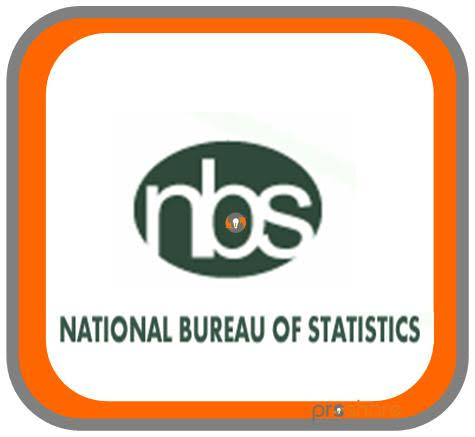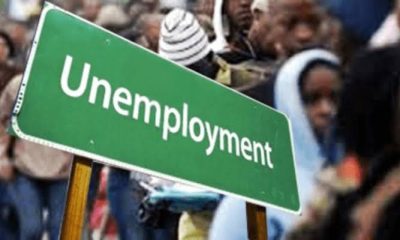National
Nigeria’s unemployment rate drops by 4.1%, says Statistician-General

Nigeria’s unemployment rate dropped to 4.1 per cent in the first quarter of 2023 from 5.3 per cent in the fourth of 2022.
Mr Adeniran Adeyemi, the Statistician General of the Federation and Chief Executive Officer of the National Bureau of Statistics (NBS), said this on Thursday during the inauguration of the New Nigeria Labour force Survey (NLFS) in Abuja
Adeniran said that the drop in NLFS from 33.3 per cent in the Fourth quarter 2020 to its present rate was based on change in methodology adopted and not government performance.
The News Agency of Nigeria (NAN) reports that the new NLFS unveils a set of labour force indicators designed to provide unparalleled insights into the dynamics of the workforce in Nigeria.
The NLFS was conducted by the NBS in collaboration with the World Bank (WB) and the International Labour Organisation (ILO) in response to the labour market dynamics
Adeniran said “let me at this point clearly state that this methodology review has nothing to do with whitewashing the image of any government or political party.
“This process is routine for any responsible statistical office, and we have no reason to continue to ignore the adoption of new methods, when the evidence clearly indicates the need for it.
“As a national statistical office, our responsibility is to provide government and all users with accurate data for evidence-based decision making, adhering to the highest possible standards, and our commitment in this regard is unwavering.”
According to Adeniran, the new method which indicates that not less than 73 per cent of Nigerians are engaged in one form of work, recognises all forms of engagements from which individuals earn income.
He said using the new ILO definition, the survey showed that the unemployment rate for the fourth quarter of 2022 stood at 5.3 per cent and 4.1 per cent for the first quarter of 2023.
“This figure aligns perfectly with neighbouring countries around Nigeria. Ghana (3.9per cent), Niger (0.5 per cent), Chad (1.4per cent), Cameroon (4.0per cent), Togo (4.1per cent), Benin Republic (1.7per cent) amongst others.
“In responding to the shifting global landscape and the ever-changing data ecosystem, it is imperative for us to continuously adapt the way in which we collect and analyse data.
“This is to ensure that we are producing data that reflects reality and the experiences of Nigerians.
“These changes also includes a revision to the design and methodology applied in the conduct of the actual survey.
“Which is the survey that produces commonly known headline Unemployment and Underemployment rates, as well as other labour market indicators that guide policymakers, researchers, and other users,” he said.
According to him, the results indicates a scarcity of Wage-employment, as the share of those employed in Wage-employment during the reference quarters was 13.4 per cent in Q4 2022 and 11.8 per cent in Q1 2023.
Adeniran said that the working age population which was defined previously as persons aged 15-64, is now defined as persons aged 15 and above.
He said this was a very important change particularly in the Nigerian context as it recognises the labour contributions of persons above the age of 64 which was not done previously.
The NBS boss said the unemployed appeared to be the most controversial amongst the changes announced under the review.
According to him, the new standard defines the unemployed as persons within the Labour force, who within the reference period did not work for pay or profit for a minimum of 1 hour.
“In the real sense, nobody works 1 hour a week and then sits down and does nothing else when there are opportunities for more hours of work.
“The statistics show that only 7.1 per cent of those working, work between 1 – 19 hours per week. So, 1 hour is just a benchmark and nothing more than that,” he said.
The survey revealed that about three quarters of Nigerians in the working age population, 73.6 per cent in Q4 2022 and 76.7 per cent in Q1 2023 were engaged in some form of work for pay or profit in the quarters under review.
Earlier, the World Bank’s Country Director, Shubham Chaudhuri pledged the continued support of the bank to ensure a robust, regular national LFS data for the country.
Chaudhuri said a reliable data provided the government with knowledge about the nation’s welfare and ensured the right intervention and programs needed to address it’s challenges.
The Minister of Budget and Economic Planning, Abubakar Bagudu, said data was key to national planning and development.
According to Bagudu, President Bola Tinubu believes in reliable data for planning and will support anything that will lead to production of appropriate data.
“To create jobs for youths, we need this kind of data, a lot needs to be done to address the high rate of unemployment in the country. The President is desirous of reducing unemployment.
“Nigeria is one of the countries with absorptive capacity, so what we need is to provide better environment and more incentives,” he said.
While commending efforts of NBS and its partners in revising the methodology, Bagudu said the ministry would from 2024 use of the revised data more practically.
Meanwhile, the Acting CBN Governor, Mohammed Tumala said labour statistics was one of the most important inputs to economic policy and business decisions.
Tumula said labour was the most important of the factors of production and determined both the quantity and quality of utility of other factors.
While commending efforts of the NBS, he stressed the need for synergy with communication experts to ensure proper linkage and dissemination of data to the public.
Similarly, Prof. Mike Obadan, Non Executive Director and member MPC, CBN also reiterated the need for NBS to ensure robust strategy for communicating its survey findings to the public in simple language.
Headline
EFCC bars dollar transactions, orders embassies to charge in naira

The Economic and Financial Crimes Commission has barred foreign missions based in Nigeria from transacting in foreign currencies and mandated them to use Naira in their financial businesses.
The EFCC has also mandated Nigerian foreign missions domiciled abroad to accept Naira in their financial businesses.
The anti-graft agency said the move is to tackle the dollarisation of the Nigerian economy and the degradation of the naira
The Commission, therefore, asked the government to stop foreign missions in Nigeria from charging visa and other consular services in foreign denominations.
The EFCC gave the advisory in a letter to the Minister of Foreign Affairs, Amb. Yusuf Tuggar, for onward transmission to all foreign missions in the country.
In the letter, the EFCC said it issued the advisory because the practice of paying for consular services in dollars was in conflict with extant laws and financial regulations in Nigeria.
In a letter dated April 5, 2024, which was addressed to the Minister of Foreign Affairs, Ambassador Yusuf Tuggar, titled: “EFCC Advisory to Foreign Missions against Invoicing in US Dollar,” the EFCC Chairman, Ola Olukoyede expressed dismay over the invoicing of consular services in Nigeria by foreign missions in dollars.
The EFCC cited Section 20(1) of the Central Bank of Nigeria Act, 2007, which makes currencies issued by the apex bank the only legal tender in Nigeria.
The letter read, “I present to you the compliments of the Economic and Financial Crimes Commission, and wish to notify you about the commission’s observation, with dismay, regarding the unhealthy practice by some foreign missions to invoice consular services to Nigerians and other foreign nationals in the country in United States dollar ($).
“It states that ‘the currency notes issued by the Bank shall be the legal tender in Nigeria on their face value for the payment of any amount’.
“This presupposes that any transaction in currencies other than the naira anywhere in Nigeria contravenes the law and is, therefore, illegal.”
The commission further stated that the rejection of the naira for consular services in Nigeria by certain missions, along with non-compliance with foreign exchange regulations in determining service costs, is not just unlawful but also undermines the nation’s sovereignty embodied in its official currency.
The letter continues: “This trend can no longer be tolerated, especially in a volatile economic environment where the country’s macroeconomic policies are constantly under attack by all manner of state and non-state actors.
“In light of the above, you may wish to convey the commission’s displeasure to all missions in Nigeria and restate Nigeria’s desire for their operations not to conflict with extant laws and regulations in the country.”
Diplomatic sources said yesterday, May 10, that some embassies were wondering whether the EFCC’s advisory represented the position of the Federal Government.
Headline
Suspend cybersecurity levy– Reps to CBN

The House of Representatives on Thursday asked the Central Bank of Nigeria to withdraw the circular directing all banks to commence charging a 0.5 per cent cybersecurity levy on all electronic transactions within the country, The Nation reports.
The motion on the urgent need to halt and modify the implementation of the cybersecurity levy was moved by the member representing the Obio/Akpor Constituency, Kingsley Chinda.
The House urged the CBN to withdraw the circular and “issue a more understandable one,” as Chinda had drawn the attention of the House to multiple interpretations of the CBN directive against the specifications in the Cybersecurity Act.
-

 Headline5 days ago
Headline5 days agoPrince Harry visits sick Nigerian soldiers in Kaduna
-

 Entertainment5 days ago
Entertainment5 days agoAMVCA Cultural Day: BBNaija’s Neo, Venita win Best Dressed Male, Female
-

 Metro5 days ago
Metro5 days agoEx-Sports Minister laments after hospital neglected him for hours over N80000 deposit
-

 Headline5 days ago
Headline5 days agoEFCC bars dollar transactions, orders embassies to charge in naira








